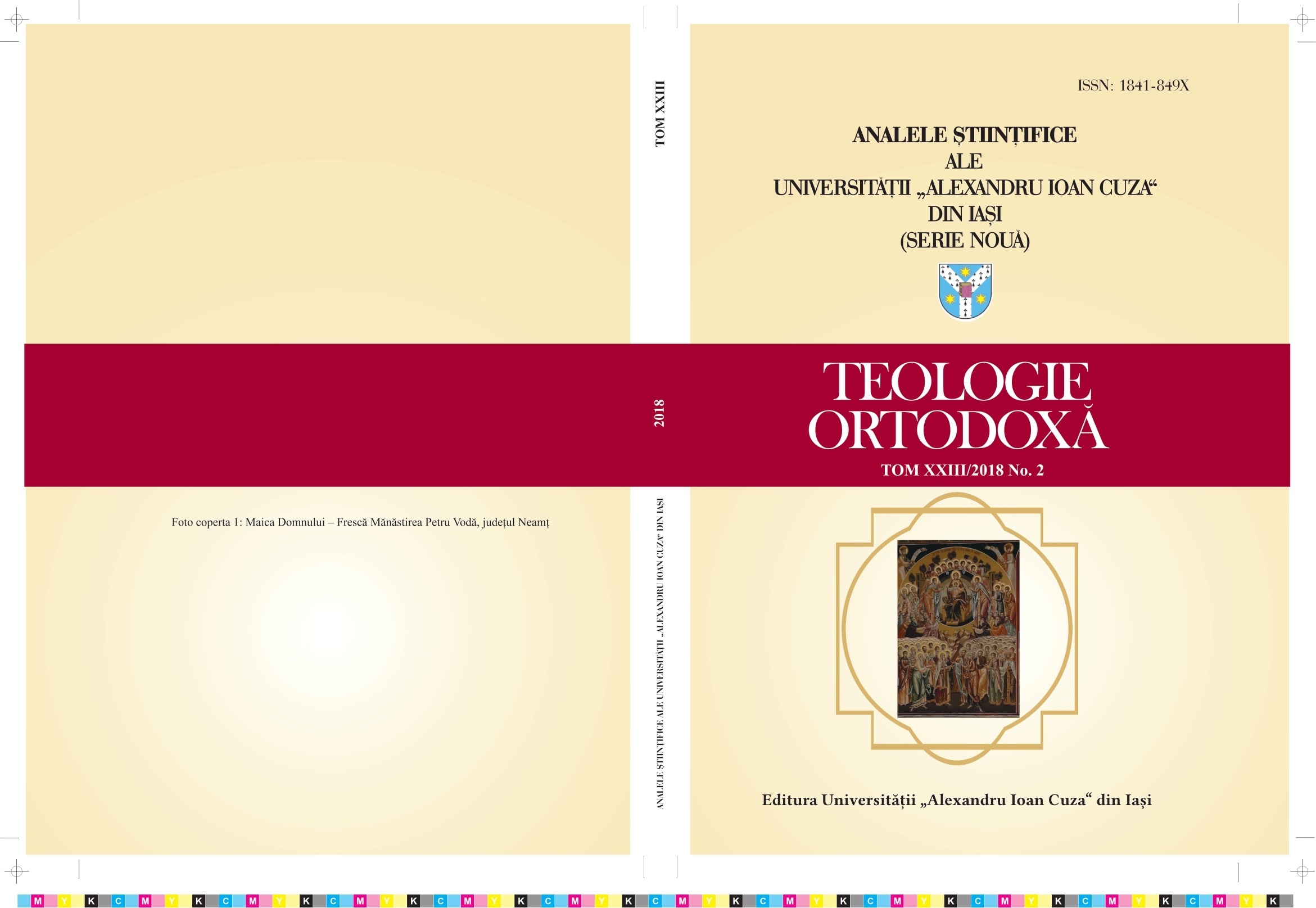Ioan C. TEŞU - Sufferings and Illness – Passport to the Sweetest Heaven
Ioan C. TEŞU
Rev. Prof. PhD. Faculty of Orthodox Theology, Alexandru Ioan Cuza University of Iaşi, ROMANIA
Abstract:
St. Paisios of the Holy Mountain, who venerated among saints starting January 2015, is one of the most beloved contemporary Orthodox saints. What made him so loved and cherished were his improved life, his practical and experimental teachings, as well as the many wonderful works he did during his life, among which the most frequent and the highest one was the resurrection of souls from the death of sin. His spiritual words drew attention by their richness and depth, the Athonite Saint giving extremely current advice to the problems and troubles of this world and of the contemporary man, in the Church spirit and conscience. But the same exhortations impressed by their sensitivity, being able to offer answers to the soul, that bring inner peace and give spiritual high meaning. He often used to say he tried to put “sunshine” on the souls troubled by worries and darkened by sins and passions, bringing light and hope and trust in the love, kindness and mercy of the Heavenly Father Who does not enjoy man’s suffering but wishes his salvation, since He created man out of infinite love, and not for sin, chastisement or suffering, but for eternal life and happiness [“I make sunshine” he said and he meant that as the sun is absolutely necessary to open flowers, so a slight pastoral touch helps to open and heal the soul] (cf. Cuviosul Paisie Aghioritul, trans. Nuţescu 2003a: 13). He had to take the cross of suffering in his body because of the colon cancer he asked for, received and bore it spiritually like a real blessing. This was his way to take upon him a part of world sufferings and he made the disease an exceptional way of approaching and uniting with God, by going along with Christ the Saviour through the Golgotha of suffering to His Resurrection. Because his words have the advantage of being uttered by a contemporary saint who suffered himself from this cruel disease and they spring from God’s gift and his own experience, they also have the ability to offer consolation and comfort to the souls “visited” by sickness and suffering. Completely opposite to the general expectations that consider the incidence of cancer or oncologic diseases will decrease, the medical sources tell us they will grow in an alarming and frightening way in the coming years. Therefore, on the following pages, I will try to present some of the rich spiritual meanings that St. Paisios gave to illness in general as well as the ways or means of confronting suffering, as described by the Athonite Father.
Keywords:
Spirituality, Spiritual Fathers, St. Paisios, illness, virtues, salvation
Bibliography:
- Bejan, Preot, Dimitrie. 1995. Bucuriile suferinței. Evocări din trecut (Fr. Dimitrie Bejan, The Joys of Suffering. Evocations of the Past). Chișinău: Cartea Moldovei
- Cuviosul Paisie Aghioritul. 2000. Cuvinte duhovnicești. II. Trezire duhovnicească (Elder Paisios of Mount Athos, Spiritual Counsels, Volume 2: Spiritual Awakening). Traducere din limba elenă de Ieroschim. Ștefan Lacoschitiotul. Schitul Lacu – Sfântul Munte Athos. București: Evanghelismos.
- - Cuviosul Paisie Aghioritul. 2003a. Cuvinte duhovnicești. I. Cu durere și dragoste pentru omul contemporan, Prolog (Elder Paisios of Mount Athos, Spiritual Counsels, Volume 1: With Pain and Love for Contemporary Man). Traducere din limba greacă de Ieroschim. Ștefan Nuțescu. Schitul Lacu – Sfântul Munte Athos. București: Evanghelismos.
- Cuviosul Paisie Aghioritul. 2003b. Cuvinte duhovnicești. III. Nevoință duhovnicească (Elder Paisios of Mount Athos, Spiritual Counsels, Volume 3: Spiritual Struggle). Traducere din limba greacă de Ieroschim. Ștefan Nuțescu. Schitul Lacu – Sfântul Munte Athos. București: Evanghelismos.
- Cuviosul Paisie Aghioritul. 2003c. Cuvinte duhovnicești. IV. Viața de familie (Elder Paisios of Mount Athos, Spiritual Counsels, Volume 4: Family). Traducere din limba greacă de Ieroschim. Ștefan Nuțescu. Schitul Lacu – Sfântul Munte Athos. București: Evanghelismos.
- Cuviosul Paisie Aghioritul. 2005. Epistole (Elder Paisios of Mount Athos, Letters). Traducere din limba greacă de Ieroschim. Ștefan Nuțescu. Schitul Lacu – Sfântul Munte Athos. București: Evanghelismos.
- Cuviosul Paisie Aghioritul. 2009. Mica Filocalie (Elder Paisios of Mount Athos, Little Philokalia). Traducere de Pr. Victor Manolache. Galați: Egumenița; Cartea Ortodoxă, 2009.
- Cuviosul Paisie Aghioritul. 2013. Cuvinte duhovnicești. VI. Despre rugăciune (Elder Paisios of Mount Athos, Spiritual Counsels, Volume 6: On Prayer). Traducere din limba greacă de Ieroschim. Ștefan Nuțescu. Chilia “Buna-Vestire”, Schitul Lacu – Sfântul Munte Athos. București: Evanghelismos.
- † Isaac, Ieromonahul. 2005. Viața Cuviosului Paisie Aghioritul († Elder Isaac, Elder Paisios of Mount Athos). Traducere din limba greacă de Ieroschim. Ștefan Nuțescu. Schitul Lacu – Sfântul Munte Athos. București: Evanghelismos.
- Sfântul Isaac Sirul. 1981. “Cuvinte despre nevoințe”, în Filocalia sau culegere din scrierile Sfinților Părinți care arată cum se poate omul curăți, lumina și desăvârși (St. Isaac of Syria, The Ascetical Homilies). Traducere, introducere și note de Pr. Prof. Dr. Dumitru Stăniloae, vol. X. Bucureşti: Editura Institutului Biblic și de Misiune al Bisericii Ortodoxe Române
- Zurnazoglu, Nicolae. 2006. Cuviosul Paisie Aghioritul. Mărturii ale închinătorilor (Nicolae Zurnazoglu, Elder Paisios of Mount Athos. Testimonies of Worshippers). Traducere din limba greacă de Ieroschim. Ștefan Nuțescu. Schitul Lacu – Sfântul Munte Athos. București: Evanghelismos.

